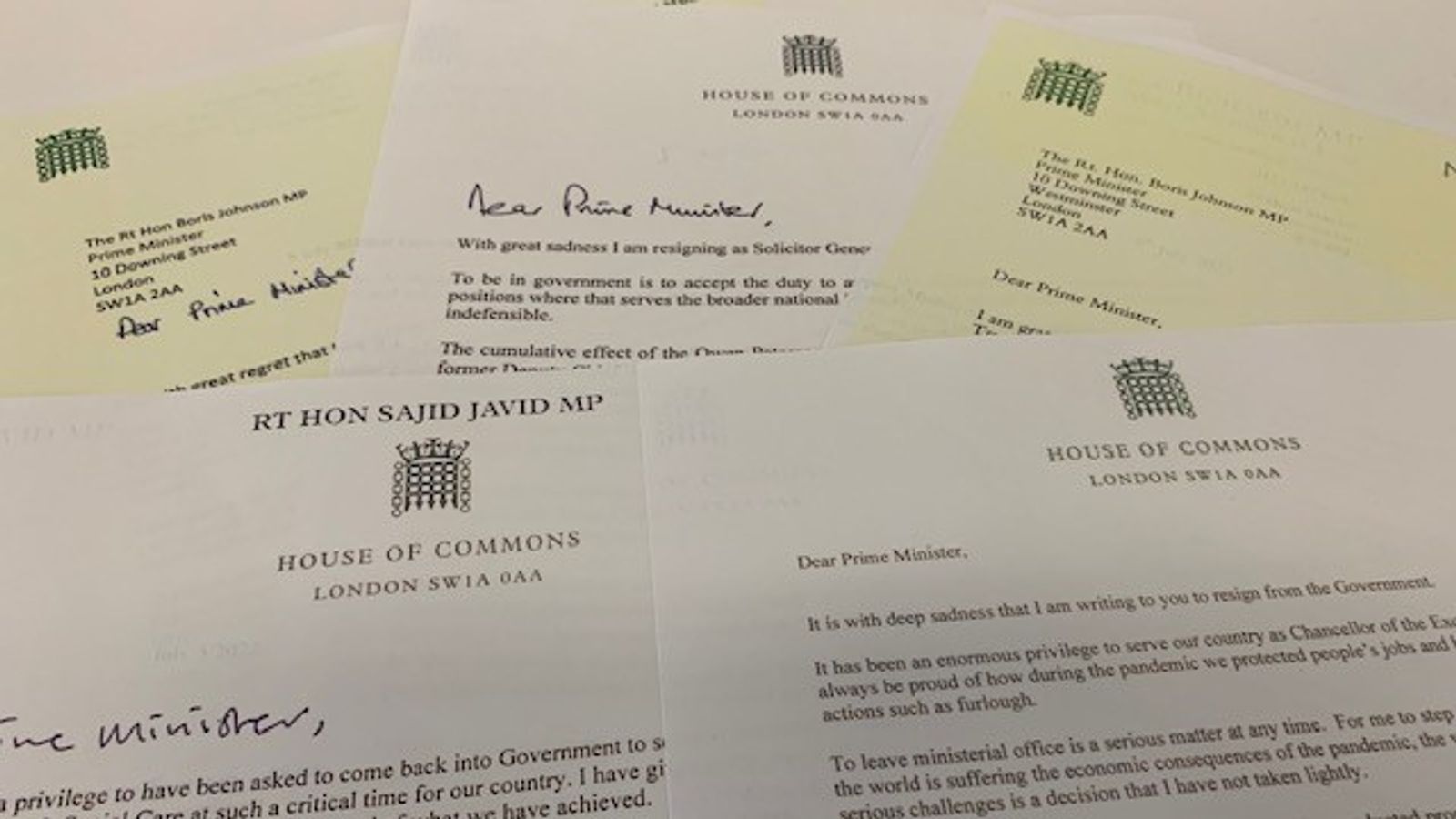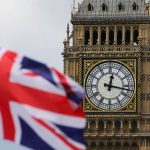Boris Johnson had a stuffed letterbox this week as several ministers decided to write their resignation letters, pack up their desks and leave their posts.
The exits appear to have been prompted by the PM’s hiring and handling of former deputy chief whip Chris Pincher, who quit his job after being accused of groping two men at a private member’s club in London last week.
Politics Hub: More resignations to start the day as pressure mounts on PM – live updates
Let’s take a look at the resignation letters and see in their own words why they left their roles.
Sajid Javid
First out of the blocks was the now former health secretary Sajid Javid – the second time he has resigned from a Johnson government post, having left the Treasury back in 2020.
In his letter to the PM, he said it had been a “privilege” to do the job “at such a critical time for our country”.
But, he continued: “It is with enormous regret that I must tell you that I can no longer, in good conscience, continue serving in this government.
Mr Javid added: “Conservatives at their best are seen as hard-headed decision-makers, guided by strong values. We may not have always been popular, but we have been competent in acting in the national interest.
“Sadly, in the current circumstances, the public are concluding that we are now neither. The vote of confidence last month showed that a large number of our colleagues agree. It was a moment for humility, grip and new direction.
“I regret to say, however, that it is clear to me that this situation will not change under your leadership – and you have therefore lost my confidence too.”
Rishi Sunak
The next exit was an even bigger shock, as Rishi Sunak confirmed on Twitter he was leaving No 11.
After expressing his “sadness” and what “an enormous privilege” it was to do the job, he wrote: “To leave ministerial office is a serious matter at any time.
“For me to step down as chancellor while the world is suffering the economic consequences of the pandemic, the war in Ukraine and other serious challenges is a decision that I have not taken lightly.
“However, the public rightly expect government to be conducted properly, competently and seriously. I recognise this may be my last ministerial job, but I believe these standards are worth fighting for and that is why I am resigning.”
Mr Sunak said he had been “loyal” to the PM, saying: “That is why I have always tried to compromise in order to deliver the things you want to achieve. On those occasions where I disagreed with you privately, I have supported you publicly.”
But, he adds: “I firmly believe the public are ready to hear that truth. Our people know that if something is too good to be true then it’s not true. They need to know that whilst there is a path to a better future, it is not an easy one.
“In preparation for our proposed joint speech on the economy next week, it has become clear to me that our approaches are fundamentally too different.”
Andrew Murrison
The third member of government to quit was the PM’s trade envoy to Morocco, Andrew Murrison.
In his remarks, he pointed to another letter – the one from Lord McDonald, accusing Number 10 of briefing false lines to the press over what Mr Johnson knew about his former deputy chief whip’s behaviour.
Mr Murrison said it was “the last straw in the rolling chaos of the past six months”, adding: “Others must square, as best they can, their continuing employment of your patronage with their personal sense of decency, honour and integrity, but I no longer can.
And he finished his letter by saying: “Your position has become unrecoverable. I strongly urge you to resign.”
Bim Afolami
For the vice chairman of the Conservative Party, it wasn’t a letter that revealed his intentions – it was a television interview.
When asked for his thoughts on the scandal surrounding Chris Pincher, Bim Afolami told Talk TV live on air: “You have to resign.”
He said that he “can’t serve under the prime minister” as he had “lost trust in people”, adding: “The prime minister asked at the confidence [vote] to be given time to restore that trust, and I took that as many others did in the party.
‘But I think it becomes clear, especially after losing the support of two of his closest party colleagues, that the time has come for him to stand down.”
Read more: The obscure looming election that could be key to ousting Johnson
Please use Chrome browser for a more accessible video player
Jonathan Gullis
A parliamentary private secretary (PPS) in the Northern Ireland office joined the growing ranks by tendering his resignation too.
Jonathan Gullis actually spends a lot of his letter praising the work of the government, including the PM’s personal backing of his local constituents.
But he adds: “I feel for too long we have been more focused on dealing with our reputational damage rather than delivering for the people of this country and spread opportunity for all, which is why I came into politics.
“It is for this reason I can no longer serve as part of your government.”
Saqib Bhatti
The second PPS to quit was Saqib Bhatti, who had been a junior minister in the Department of Health and Social Care.
He said he would “always be proud of the fact that we navigated the country through its darkest hour” during the pandemic, and said he was “grateful” for Mr Johnson’s “leadership.
But in a change of tone, Mr Bhatti wrote: “The Conservative and Unionist Party has always been the party of integrity and honour. I feel that standards in public life are of the utmost importance, and the events of the past few months have undermined public trust in all of us.
“I have been grappling with these issues for some time and my conscience will not allow me to continue to support this administration. It is for this reason that I must tender my resignation.”
Nicola Richards
Another PPS from the transport department joined the exodus, with Nicola Richards saying it was “no longer feasible” for her to carry out the role.
“At a time when my constituents are worried about the cost of living and I am doing my best to support them, I cannot bring myself to serve as a PPS under the current circumstances, where the focus is skewed by poor judgement that I don’t wish to associate with,” she wrote.
Ms Richard also said she was “loyal to the Conservative Party”, but added it was “currently unrecognisable to me – I believe something must change”.
Read more: Who’s staying, who’s going, who’s staying silent?
Please use Chrome browser for a more accessible video player
Virginia Crosbie
Another PPS then went, but this time from the Wales Office and with an excoriating letter.
Virginia Crosbie did not take long to get to the crux of the matter, saying: “Sadly, I am forced to say that the sheer number of allegations of impropriety and illegality – many of them centred around Downing Street and your premiership – is quite simply making your position untenable.”
She said the PM risked “irrevocably harming” the party if he stayed on, saying Mr Johnson was “either badly advised or unable to change or reform the dysfunctional operation at the centre of the government you lead”.
Ms Crosbie praises the “considerable achievements” of the government over Brexit, the pandemic and the situation in Ukraine, but concluded that they “continue to be overshadowed by the simple calculation I believe the country has made – that you cannot be trusted to tell the truth”.
She added: “This can never be a position to inhabit for anyone in public life, let alone a prime minister.
“The party I love, and this government, are now facing continued distraction, scandal and allegations of cover up.”
Theo Clarke
The next trade envoy to end their ministerial journey was Theo Clarke, who resigned from her role working with Kenya.
She said she had personally supported the PM over the years, campaigning for him to become London mayor, but “as one of the party’s new female MPs and a member of the Women and Equalities Select Committee, I take allegations of sexual misconduct very seriously”.
She continued: “To learn that you chose to elevate a colleague [Pincher] of a position of pastoral care for MPs whilst in full knowledge of his own wrongdoing shows a severe lack of judgement and care for your parliamentary party.
“I was shocked to see colleagues defending the government with assurances that have turned out to be false – this is not the way that any responsible government should act.”
Alex Chalk
As Tuesday was drawing to a close, Solicitor General Alex Chalk also put his letter in.
He said being in government meant he had to “accept the duty to argue for difficult or even unpopular policy positions where that serves the broader national interest”, but he adds: “It cannot extend to defending the indefensible.”
He said the “cumulative effect” of several scandals, including the handling of the Mr Pincher case and Owen Patterson lobbying row, was that “public confidence in the ability of Number 10 to uphold the standards of candour expected of a British government has irretrievably broken down”.
Mr Chalk added: “I regret that I share that judgement. This comes at a moment of intense challenge for our country, when trust in government can rarely have been more important. I’m afraid the time has therefore come for fresh leadership.”
Laura Trott
As the sun rose on a new day, there were more letters to come for Mr Johnson, and first up was another transport PPS, Laura Trott.
Posting a short statement on her Facebook page, the MP said: “Trust in politics is – and must always be – of the utmost importance, but sadly in recent months this has been lost.”
She also thanked local residents who had written to her “expressing [their] views”, and said it played a part in her decision.
Will Quince
Whilst many outside the Westminster bubble may not have heard of Will Quince before this week, his name rose to fame after his appearance on the airwaves on Monday, saying he had been given “categorical assurance” from Number 10 that the PM did not know about specific allegations against Chris Pincher.
As we discovered later, that was not quite accurate…
Tweeting out his letter, Mr Quince said the PM had offered him a “sincere apology” for the briefing “which we now know to be inaccurate”.
He added: “It is with great sadness and regret that I feel that I have no choice but to tender my resignation… as I accepted and repeated those assurances in good faith.”
Robin Walker
The next to join the growing list of resignations was Robin Walker, who had been school standards minister until this morning.
He said: “Unfortunately, recent events have made it clear to me that our great party, for which I have campaigned all my adult life, has become distracted from its core missions by a releantless focuys on questions over leadership”.
Mr Walker pinted to the exits of the chancellor and health secretary as reflecting a “worrying narrowing of the broad church that I believe any conservative government should seek to achieve”.
And while he praised the PM’s work through the pandemic, he added: “In recent months, those great achievements… have become overshadowed by mistakes and questions about integrity.”
Felicity Buchan
A short but punchy letter from the PPS at the Department for Business, Felicity Buchan.
She ways while it has been a “huge honour” to serve, “I am afraid that you have lost the confidence of my constituents and me”, adding: “The current situation is untenable.”
Ms Buchan concludes: “I believe passionately in the Conservative values and want to ensure that we are implementing Conservative policies without distractions. That requires fresh leadership and it requires a new vision for the country.”
John Glen
The Economic Secretary to the Treasury, John Glen, was next to join the growing numbers, having served in the role under three chancellors.
He praises the work of his department, saying he is proud of what he has done – especially over the Brexit transition.
But he adds: “Recent events concerning the handling of the appointment of the former deputy chief whip, and the poor judgement you have shown, have made it impossible for me to square continued service with my conscience.
“The country deservers better.”






















